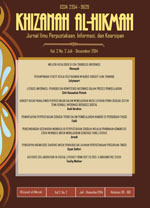Literasi informasi : peningkatan kompetensi informasi dalam proses pembelajaran
Abstract
The development of knowledge and life became ease with the presence of information communication and technology, particularly internet. Information literacy is needed to access any form of information through the internet. Academicians are expected to be information literate. They should use and evaluate information resources, especially from the internet in any kind of learning process. The ability to be literate in library services is necessary important in order to optimize library resources and services. Besides, information literacy tells end-users to recognize information sources and can be ease to find the needed information from different and varieties sources. Many models of information literacy are implemented in many libraries in which the objective is to enhance literacy skills for library users.
Downloads
References
American Library Association. (2000).”Information Literacy Competency Standards for Higher Education. Diakses dari www.ala.org/legalis.html-69, tanggal 08 November 2003
Apriyani, Mega. (2006). Literasi Informasi Pemustaka : Studi kasus di Perpustakaan Umum Daerah Provinsi DKI Jakarta. Jakarta : Universitas Indonesia. Fakultas Ilmu Pengetahuan Budaya.
Behrens, Shierley J. (1994). “ a Conceptual Analysis and Historical Overview of Information Literacy”. College & Research Libraries 56 : 309-332
Breivick, Patricia S dan E. Gordon Gee (1989) “Information Literacy : Revolution in the Library. American Library Association Presidential Committee on Information Literacy : Final Report, Chichago. Diakses dari www.infolit.org/documents/89 Report.htm-46k , tanggal 10 November 2003
Corral, Sheila (1998), Key Skills for Student in Higher Education. SCONUL Newsletter 15 : 22-29
Doherty, John J. Hansen, Mary-Anne & Kaya, Kathryn K. (1999). Teaching information skills in information age : the need for critical thinking. Library philosophy and practice, vol 1 (2). Diakses melalui http.www.webpages.uidaho.edu/~mbolin/doherty.htm, tanggal 11 Oktober 2003.
Eisenberg, M, Lowe, C.A, Spitzer, K. L. (2004). Information Literacy: Essential Skills for The Information Age. Connecticut : Libraries Unlimited.
Hasugian, Jonner. (2008). Urgensi literasi informasi dalam kurikulum berbasis kompetensi di perguruan tinggi. Pustaha: jurnal studi peprustakaan dan informasi, 4 (2) p. 34 - 44
Mandala, Rila & Hendra Setiawan (2002). Peningkatan performansi sistem temu kembali informasi dengan perluasan query secara otomatis. Proceeding the 3rd Annual Meeting of the Indonesian Digital Librray Networks. Establishing Cooperation to a Networked Information Society, Bandung : Tim KMRG-ITB
Mishra, R.N dan C. Mishra (2010), Relevance of information literacy in digital environment Journal of Emerging Trends in Computing and Information Sciences, 1 (1) h. 48-54, diakses dari http://www.cisjournal.org, tanggal 16 Juli 2012
Neely, T.Y. (2006). Information Literacy Assessment: Standards Based-Tools and Assignments. Chicago : American Library Association.
Ragains, P...et al., (2006). Setting the stage for information literacy education, dalam Ragains, P. (ed.) Information literacy instruction that works:a guide to teaching by discipline and student population, New York: Neal-Shuman, p. 1-16
Sulistyo-Basuki, (2013). Literasi Informasi dan Literasi Digital. https://sulistyobasuki.files.wordpress.com/2013/03/info-literacy4.jpg. Diunduh tanggal 10 Juli 2014.
Techataweewan, W, Woratpanya, K, Sanrach, C. (2009). The Integration of Information Literacy into Web-based Tutorial with Librarian – faculty Partnership. Asia Pacific Conference on Library and Information Education & Practice, p. 373-379.
By submitting your manuscript to our journal, you are following Copyright and License

